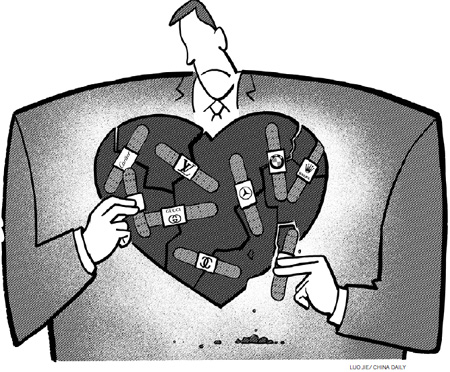 |
Large Medium Small |
|
 |
China's National Bureau of Statistics has announced that the country's economic output rose by over 10 percent in each of the past two quarters even as much of the world economy remains mired in slow growth. Another indicator of China's rapid rebound from the global economic crisis is the sale of luxury goods, with the total amount rising to $9.4 billion by the end of last year.
China now accounts for more than a quarter of the world's purchases of luxury goods. At this pace, it will soon bypass the US to become the top market for such products after Japan, even though its per capita income is still much lower than in America. Indeed, according to Du Junfei, a professor of Nanjing University, while purchases of luxury goods amount to 4 percent of consumer's assets worldwide, the figure in China is as much as 40 percent or higher.
This Chinese peculiarity reflects the distinctive makeup of the country's luxury goods market. Radha Chadha, a board member of a leading Shanghai-based consulting firm, says luxury goods buyers fall into three categories. One group is the really rich, another includes so-called "cool" youngsters, and the third consists of white-collar workers, especially managers.
Of course, the first two groups are big buyers of luxury products in the West. Haughty, affluent youngsters flood high-end malls in the US and Europe just as they do here - I see lots of these kids while taking strolls in my Sanlitun neighborhood.
Rich people in and outside China buy luxury products to show off their wealth and status. What sets China apart from Western countries and, by extension, accounts for the unusually high purchase of luxury goods in relation to consumer assets here, is the third major segment of the high-end product market: white-collar workers. While white-collar workers in the West, especially America, are big consumers, they typically hunt for bargains. This behavior is reflected in the success of retailers like Wal-Mart and Costco.
In contrast, white-collar workers in China often equate expensive luxury brands with high quality. As one white-collar worker quoted in a Xinhua China.org report put it: "I think a bag priced at 10,000 yuan is more suitable for me. It is better than 100 bags priced at 100 yuan each."
According to a recent survey of netizens in Jiangsu and Zhejiang provinces, 56.7 percent of the respondents said they saved money to buy luxury goods. One extreme example cited in the China.org report is the case of Tony Wang, a senior executive in an advertising company. Even though Wang makes 20,000 yuan a month, he limits himself to fruits and a cup of coffee for lunch in order to add to his piggy bank for luxury purchases.
While Chinese consumers at least haven't over-leveraged themselves to buy luxury goods, their obsession with high-end brand products strikes this particular laowai (expatriate) as being quite irrational. The money saved to make such purchases could surely be better spent on other things, including continuing education to upgrade skills or travel to unique destinations to broaden one's horizons.
Moreover, this white-collar behavior certainly smacks of keeping up with joneses. The desire to show off one's taste for elegance locks middle-class Chinese into a competitive struggle to sport the latest and best Italian clothes, designer handbags, and the like. And when it comes to function, most of the time one can get by just well with good generic brands versus expensive luxury goods.
Finally and most importantly, the scramble for luxury products doesn't seem to have made Chinese any happier. Indeed, in the most recent University of Michigan World Values Survey, China ranked 46th in the world with respect to the happiness of its citizens.
In my personal observation, the happiest people in Beijing are the laobaixing, or ordinary residents, I see in parks and other public spaces indulging in simple pleasures like singing and dancing together. I seriously doubt that few, if any, of these folks care much about owning lots of luxury brand products.
It is often said that money can't buy happiness; the same goes for owning a very expensive Luis Vuitton handbag.
The author is an American corporate trainer in China.